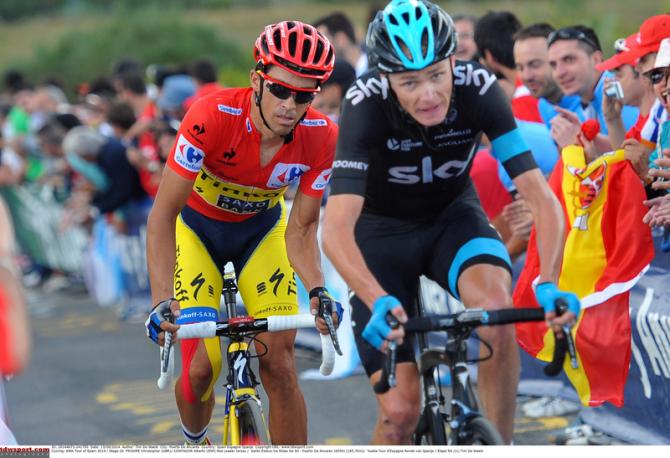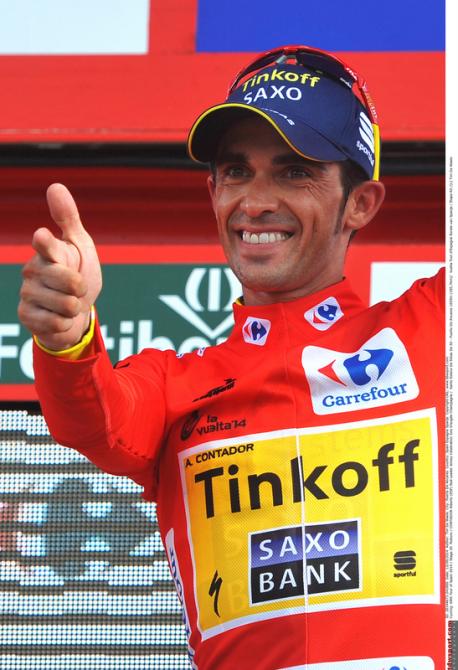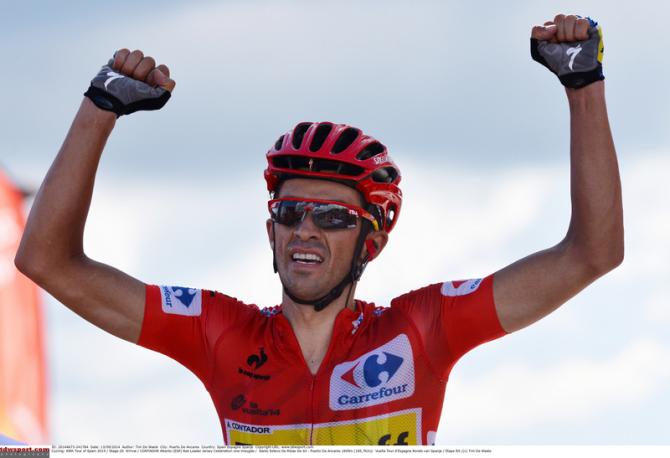Contador's Vuelta: The first stage of the 2015 Tour de France?
Spaniard ends season-long duel with Froome on top



At times, the early part of the season seemed like little more than a game of long-distance one-upmanship between Chris Froome and Alberto Contador. Froome won the Tour of Oman on the same weekend that Contador claimed a stage at the Volta ao Algarve. The Spaniard went on to win Tirreno-Adriatico and the Tour of the Basque Country, so Froome responded firmly with (an ultimately controversial) victory at the Tour de Romandie.
When their paths finally crossed at the Critérium du Dauphiné, they seemed to match one another pedal stroke for pedal stroke, at times seemingly on a startlingly different plane altogether to everybody else. Froome won the first time trial and summit finish – but only just – from Contador, who went on to move ahead of the Sky man after he crashed later in the week.
Even in their misfortune, the pair could scarcely be separated. Froome’s Tour de France defence ended on stage 5 when he suffered a fractured wrist in a crash on the road to Arenberg. Barely a week later, Contador followed him out of the race, sustaining a hairline fracture of his left tibia when he fell on the descent of the Petit Ballon.
Both men – eventually – turned up on the start line of the Vuelta a España in Jerez and – of course – each looked to depict the other as the outstanding candidate for victory. “If he's at 100 percent, then Chris Froome is the favourite,” Contador told reporters at his pre-race press conference. A couple of hours later, Froome smiled and said that “probably Alberto himself” topped the list of contenders.
Early on at the Vuelta, the question and answer format to Contador and Froome’s season-long discourse continued. They seemed almost to take it in turns to hold the floor, as if engaged in a presidential debate. They found common ground at La Zubia. Froome outlined his credentials by snaffling up some seconds at Alcaudete. Contador probed with intent at Valdelinares.
Gradually, however, the two candidates’ fortunes diverged. Contador put significant time into Froome in the Borja time trial, and stood up firmly to his questioning at La Farrapona to claim a watershed primary victory. By the time they faced off at Ancares on the penultimate day, Contador was the winner-elect and there would be no late surge from his opponent – the Spaniard ripped clear near the summit to win a second stage as Froome conceded overall victory.
The spoils from their season-long prize fight, then, fall to Contador, and given his record this year – he has finished in the top two of every stage race he has completed – there can be few arguments from the Froome camp with that verdict.
Get The Leadout Newsletter
The latest race content, interviews, features, reviews and expert buying guides, direct to your inbox!
A question lingers, however. Did the Vuelta simply constitute the final Contador-Froome battle of 2014 or the opening salvoes of a renewed duel in 2015?
The lessons of 2012
Certainly, Contador’s last Vuelta victory, in 2012, had the feel of being the first race of the following season, as he saw off Joaquim Rodriguez, Alejandro Valverde and Chris Froome to take red. Newly returned from the doping ban that had kept him out of that summer’s Tour, Contador was some way short of his best, yet somehow he conjured up an improbable remontada at Fuente Dé.
If an under-raced Contador could win the Vuelta, the thinking went, what could he achieve the following season with a “normal” build-up? It turned out to be the falsest of dawns, however. Contador laboured throughout 2013, landed just one victory and could only manage fourth overall at the Tour de France.
“He certainly wasn’t the best at the Vuelta in 2012 but he won with his courage and his intelligence,” Tinkoff-Saxo manager Bjarne Riis told L’Équipe. “I think that after his suspension, it was hard to come back. Mentally it wasn’t easy. And although he’d always trained well, I found that he had lost a bit of force.”
That Contador had been running on fumes was illustrated forcefully by his showing at the world championships two weeks afterwards, when he was caught and passed by Tony Martin in the time trial, and those in his entourage would later note that he was already mentally exhausted by the time the 2013 campaign got underway.
Froome, by contrast, completed the 2012 Vuelta in a state of physical exhaustion, yet psychologically on a high. On that occasion, Sky seemed to send Froome – “fresh” from his second place finish at the Tour – to Spain almost as an experiment, to assess how deep his reserves truly were. Froome could only manage fourth overall, almost 10 minutes down, but Sky had seen enough to place him above Bradley Wiggins in the hierarchy for the following year, and he duly prospered.
In public at least, Froome came to the 2014 Vuelta with a similar remit. He reiterated the importance of riding a three-week tour in order to build a base for next year, while Sky manager Dave Brailsford spoke simply of his rider “enjoying” his racing once again, as if he had needed to reboot after a stressful year as defending Tour champion.
Although Froome put a brave face on his eventual second place finish in Santiago, one imagines there must be deep disappointment, too, at losing out to his great rival Contador, particularly given his apparently incapacitated state. His motivation will surely only be whetted for 2015.
The true story of Contador’s surprise comeback from fracturing his tibia at the Tour, meanwhile, seems yet to be told, and though the Spaniard did not seem quite at his early-season levels during the Vuelta, he was well worth his victory.
Unlike 2012, it was a win that owed as much to the legs (or, at least, to one leg) as it did to the head. On that occasion, Contador had a pressing point to prove following his ban, but this time it seems as though his desire for revenge will not have been sated by this most recent victory. Almost as much as for Froome, it Vuelta feels a stepping stone towards 2015 as much as a destination unto itself.
Absent friends
The road to the maillot jaune in 2015, of course, will also run through Vincenzo Nibali, so resounding a Tour winner this year, and Nairo Quintana, who won the Giro d’Italia and – lest we forget – led the Vuelta at the end of the opening week before a brace of crashes ended his challenge.
There is an irony that a season seemingly destined to be defined by Contador and Froome’s hegemony instead saw two younger riders claim the two most important stage racing prizes on the calendar, and their absence from the sharp end of the Vuelta meant that it was not quite the dress rehearsal for the 2015 Tour that had been trumpeted beforehand.
And that, perhaps, is no bad thing. In cycling, the tendency is so often to cast our minds back to races past, or to project forwards to races future. For better or for worse, the 2014 Vuelta raised as many questions as it answered, but it also provided gripping drama – in the present tense.

Barry Ryan was Head of Features at Cyclingnews. He has covered professional cycling since 2010, reporting from the Tour de France, Giro d’Italia and events from Argentina to Japan. His writing has appeared in The Independent, Procycling and Cycling Plus. He is the author of The Ascent: Sean Kelly, Stephen Roche and the Rise of Irish Cycling’s Golden Generation, published by Gill Books.